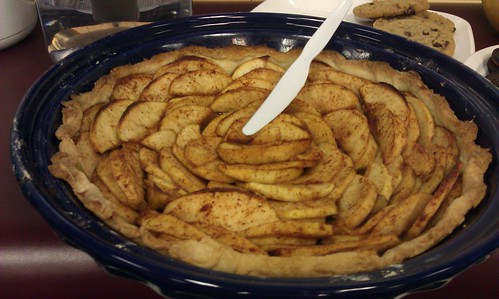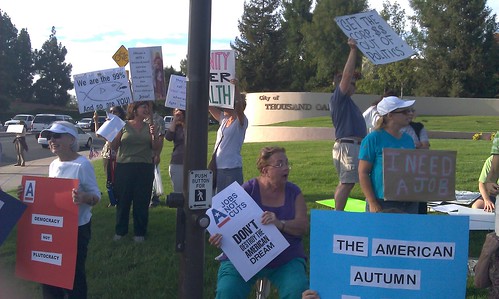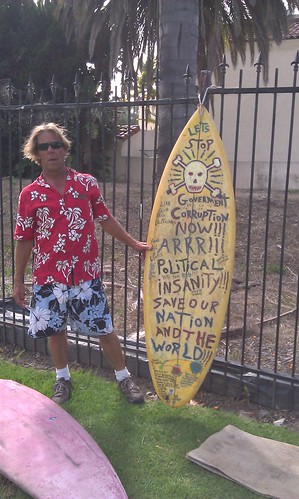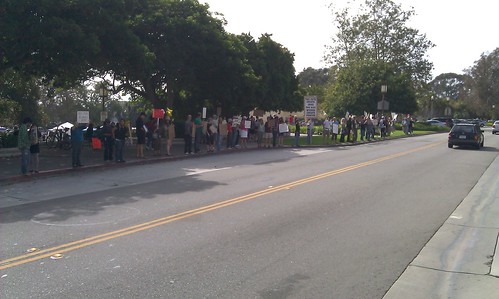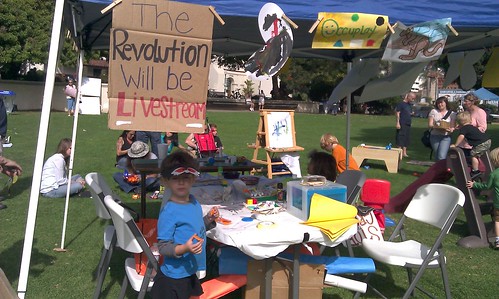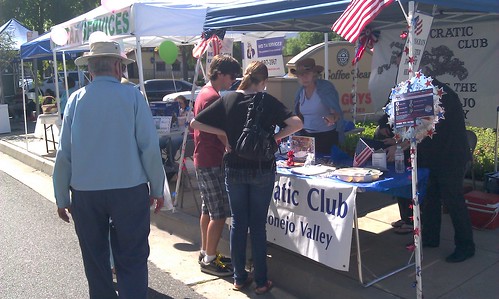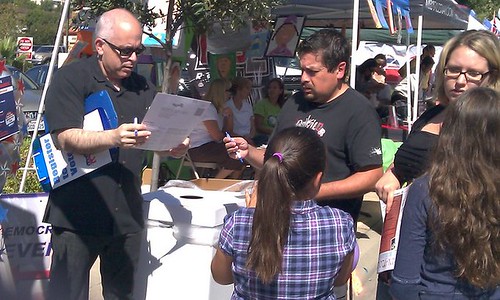Every time people want to change the world for the better, they’re asked for demands. Sometimes, that’s even appropriate. But I work in DC, and I know a lot of people who have demands.
There’s the ever-popular 10-point list of demands. There’s the classic position paper; usually just one demand, often with a narrow set of policy suggestions centered on that demand, backed up by research expressed in charts, graphs, diagrams and extended essays. There are the demands spoken by lobbyists to congressional staff in regards to specific pieces of pending legislation. Demands are legion in our nation’s capital.
For all those demands though, for all the practiced organizing and inside game connections, almost everyone I know in DC has been vastly disappointed in recent years. Excepting those members of the LGBT community who decided to complain loud and long and publicly.
So, Occupy Wall Street, what do they want? I don’t speak for them, but I’m going to guess it’s a little something like this: to whatever extent human cruelty or greed makes life suck, it should stop.
Which probably, when you think about it, is a common theme of most of the demands made by non-corporate advocacy groups everywhere. And OWS, lack of more specific formulations notwithstanding, has gotten us all talking about that with a greater degree of success than anyone else in many, many years.
OWS’ strategy is, ‘We’re going to camp in a park, come join us.’ The only clear ask is, ‘let us keep camping in the park.’ Participants are offering their help to veterans and single moms and police officers’ families and dockworkers. They’re standing up against home foreclosures, bad bosses, corporate crime and landlords who won’t fix the boiler in the basement.
It’s a messaging disaster from beginning to end. It seems incoherent and unfocused. There’s no theory of change. Hope is not a plan. The actions and locations often have no clear connection to the name of the movement. The spokespeople are whoever the hell happens to show up for the press working group.
It’s enough to cause fits in a platoon of hacks and flacks.
But it’s working. I’m beginning to think that demands are overrated.
The Economy
Much of the OWS ire is clearly reserved for Wall Street and the banking industry, centered on the economy, and money-related problems.
Some people think that’s weird, because market capitalism is so accepted that it’s become our unofficial state religion in the United States, whose main dogma includes the sovereign independence of the central bank and the worship of high profit margins. Don’t even pretend you don’t know what I mean.
So we talk about the economy as if it were a natural phenomenon, almost as if, and this is where people start using it as a tool with which to judge each other, it were an Act of God.
It isn’t.
The economy isn’t like a volcano or a meteor. The economy is how people treat each other, and too often the way we treat each other is for sh*t.
The economy doesn’t happen to people. People happen to each other through the economy, even when we use money as a means of distancing ourselves from that.
Did you ever see ‘Little Lord Fauntleroy’? The plot has this sweet, young kid ask his newly discovered, aristocratic and super-crusty grandfather not to throw his tenants out of their homes. The grandfather has lawful contracts! The tenants have obligations! Please, grandfather, don’t be mean to them. Well, okay.
Can you even imagine that happening at Bank of America?
We’ve been to the moon, mapped the Mariana Trench and walk around with Starfleet communicators in our pockets. We can’t stop treating each other like sh*t? Really? Is it that f*cking hard?
The story of our economy is Adam & Eve standing before their maker and saying, ‘It was the money. The money made me do it.’ Bull.
Tragedy
When the Greek tragedies were written, it was key that they were about important people. That’s what was supposed to make them tragic. If they’d been about ordinary people, the thinking went, who would have cared that the characters lives went horribly wrong?
Those stories are some of the first examples of celebrity culture that still seem relevant to the modern world. We still have plays, after all.
Celebrity is the foundation of the ‘great man’ model of history, with its harsh judgments on who was worth wasting vellum on prior to the advent of cheap printing, and who should die unremembered and unremarked.
Celebrity, whether we’re talking monarchs or entertainers, has been an enduring feature of concentrated human settlements. Beyond your immediate circle of friends, family and coworkers, you can really only know so many people.
Though because democracy is supposed to be about the idea that we all mattered as much as each other, celebrity culture has always been quietly at odds with it. Hardly anyone has ever believed that all human beings were equally worthy, and it really, really shows.
Celebrity culture is ancient. It’s unlikely to disappear in our lifetimes, or maybe ever, but space is now being made for something else.
Kodachrome
I’m not sure it was entirely our fault that we took so long to try democracy and equality. And by try, I mean mostly fail what we said were our own goals.
For most of history, everyone lived in tiny communities with virtually no connection to the outside, except maybe a war, all their lives. People knew their own neighborhood, they knew about a few aristocratic celebrities, and everyone else who might exist was a highly suspicious mystery.
Even in a relatively small place (by today’s standards,) like the British Isles, there was so little travel that each village generally had its own very distinct dialect. That’s how separate most people usually were from each other. They were divided and relatively easy for their local celebrity governors to rule.
As true-to-life sound and image recording developed into mass media, it seems that there was a corresponding increase in the understanding that people in other places were just people. Just like the people you knew. It was harder to fear them.
Caricature in service of the powerful became more difficult and had to be subtler, even when mass-produced.
Toni Morrison described the phenomenon of white Americans who think that they know all the good black people, while still holding on to stereotypes of black people they’d never met as lazy or dangerous or otherwise no good. The black people they knew were people, individuals with demonstrable worth and variable personalities, but the ones they didn’t know remained caricatures.
Which is exactly how the wealthy landowners, who invented whiteness to avert class-based political alliances among the poor, wanted all European immigrants to the Americas to think.
Then Americans were shown a picture of Emmet Till in his coffin. For many white Americans, this was the first image of a black person they didn’t know that broke caricature. He was not an insult; he was a child. His humanity was impossible to deny.
Robert Kennedy showed America the face of Appalachian poverty during his presidential campaign, and it touched people’s hearts. After that, there was a war on poverty, which was even taken seriously for a while.
A Vietnam War photographer showed America a picture of a napalmed child. It made people hurt, one person seeing another in pain and feeling an echo of horror. The discussion of the war changed from that moment.
After these disasters for the powers that be, media stopped showing many actually touching images of caricatured groups.
The establishment media, partly owned by such wealthy warmongers as General Electric, has worked to caricature the poor, for example, as violent or lazy, layering that in with established slurs on predominantly poor racial minorities. Infamously and recently, white victims of Hurricane Katrina were labeled as ‘looking for supplies,’ while black victims were labeled as looters.
The beautiful thing about this moment in time is that social media is giving us back the early promise of true-to-life recording.
We can see each other’s faces, hear each other’s voices and know each other’s strength and folly from far away. When we can know each other like that, with technology as a direct facilitator rather than a lying intermediary, it’s harder to make each other into jokes and slurs.
I saw Neda Agha-Soltan close her eyes for the last time. She and her fellow demonstrators will forever be real to me. I saw. People, not abstractions.
You may have seen that, too. It was one of many moments of ordinary people becoming real to ordinary strangers far away.
From the pictures of people who held Tahrir Square to those of Spain’s Indignados, or from the words of Syrian demonstrators tweeted live and direct to the entire world, we are all creating space for non-celebrities to become real to each other.
Democracy
Our encounters with the reality of previously distant people, who aren’t friends or family or coworkers, but also not celebrities, are hugely important.
Because if we want to someday have a real democracy, it must become more important, to both you & me, to know the name Oscar Grant than the names Brad Pitt, Hillary Clinton or Richard Branson.
Which seems to be what’s happening with the occupations; I see ordinary people more interested in each other’s doings than the deeds of the mighty. It’s a thing that’s only possible because of the level of detail & fidelity with which we can, and now do, publicly communicate.
We are silly and serious together. We can read each other’s live commentary on events as if in a vast auditorium where each voice still carried clearly. The audience is as real as the person on stage we’re all looking at and getting to know.
Humans have never before had such powerful tools for amplifying ordinary conversation. Even when our conversations are infuriating, we’re getting to know each other. We are interested in each other. We care.
I don’t mean care in some warm and fuzzy kind of way, or as an expression of sympathy in case of misfortune. To care is to concern oneself, to attend, to notice.
If you can’t care about someone, you can’t believe in his or her equal humanity. You can’t coexist in meaningful democratic relationship to each other, where you respect each other as co-creators of a shared society.
It takes time to care about people, to develop the practice of attending to them and looking out for their interests.
Millions of people have decided that it’s time to develop this practice in regards to one another, right now. This exercise, if it’s to be done at all, will take a while. We don’t all get along very well, as you may have noticed. But we have every reason to hope that if we come to this honestly, with compassion, we will learn to appreciate and care for each other.
The most important encounters of our lives, and possibly human history, are happening today, between ‘nobodies’, through a hybrid of online and offline public forums.
What are our demands? Care about us.
This is not a request solely of the powerful, but also of each other, of ordinary strangers. You learn to care about me as I learn to care about you.
Whoever you are. It doesn’t matter. But also, it matters more than anything. We must live together and share the same world.
Millions of us have decided to have these encounters as part of inviting ourselves to the discussions where big decisions are made. We’re meeting our fellow ambassadors and forming working groups. So we’re going to have to also demand some patience and some space. Especially because we all need more practice at democracy, and not waiting on great people who neither know nor care about us.
In order to make this happen, we’re going to have to insist, and believe, that a General Assembly is as important as a G20 summit.
Very little has prepared us well for the ongoing practice of democracy. It doesn’t matter. We’ll figure it out together, which is the whole point.

